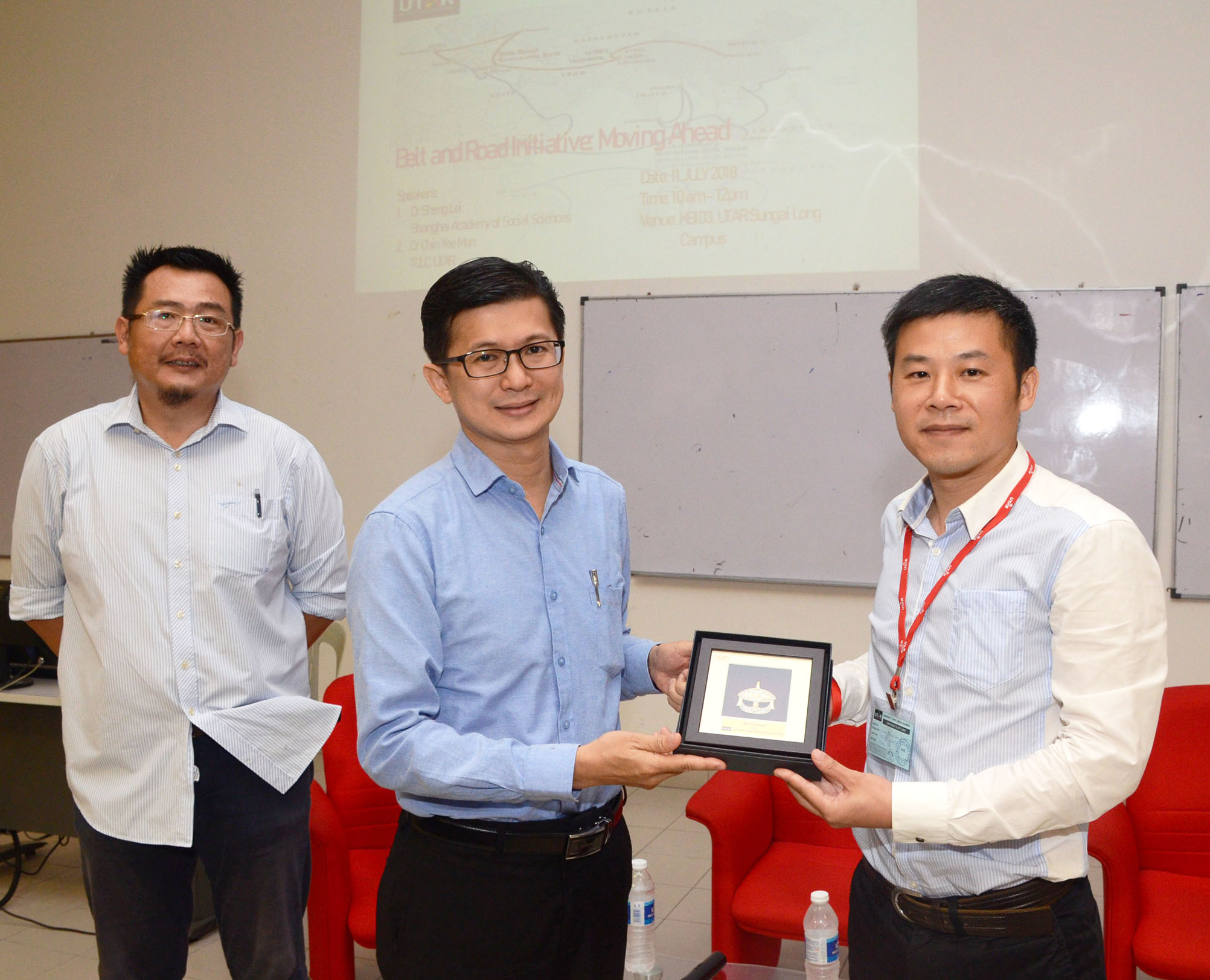

Dr Sheng Lei (left) and Assoc Prof Dr Chin delivering their talk
The Tun Tan Cheng Lock Centre for Social and Policy Studies (TCLC) along with the Belt and Road Strategic Research Centre (BRSRC), Institute of Chinese Studies and Institute of Strategic Analysis and Policy Research (INSAP) organised a talk on “Belt and Road Initiative (BRI): Moving Ahead” at Sungai Long Campus on 11 July 2018.
Present at the talk were INSAP Director Yap Hon Lun, Centre for Foundation Studies lecturers Teen Soh Hong, Ngo Siau Woon, Liang Chooi Ling, lecturers and students. Speaking at the event were Shanghai Academy of Social Sciences Assoc Prof Dr Sheng Lei and TCLC Chairperson Assoc Prof Dr Chin Yee Mun. The talk aimed to provide the students with the background and basic understanding of BRI and to highlight BRI’s impact on globalisation, new technology revolution and world’s economic growth.
Assoc Prof Dr Sheng Lei started his talk by explaining to the audience what “The Belt and Road Initiation (BRI)” was all about and why the initiative was actively introduced by China. He also explained the current status of BRI and the challenges it faces, and stated how it is correlated to the growth of Malaysia and China’s economic relationship. “It is a misconception that the initiative is meant to transfer China's overcapacity to other countries. Indeed, China has the advantage on production capacity but not on the low-end product,” he said.
He also highlighted the aspects of Five Connectivity, including policy coordination (政策沟通), facilities connectivity (设施联通), unimpeded trade (贸易畅通), financial integration (资金融通) and people-to-people bond (民心相通), and he explained how this could drive the development of the countries along the Road as well as stimulate the growth of the whole region and the global economy.
Besides that, he emphasised that Malaysia is an important cooperation partner for China and said, “Previous investment projects by China in Malaysia would be reviewed and adjusted by the new government, but it would not freeze. China will take more actions to learn about Malaysia in order to further boost mutual understanding and win-win cooperation between the two countries,” he said.
In Dr Chin’s talk, he spoke about a study conducted by Lee Kong Chian Faculty of Engineering and Science Head of Mathematical and Actuarial Sciences Department Dr Chang Yun Fah, LKC FES lecturer Phua Yeong Nan and himself titled “Belt and Road Initiative (BRI), Public Opinion and Malaysia Chinese Youth”. Dr Chin gave an introduction of BRI as well as the sociological definitions of public opinion. He continued on BRI’s issues in Malaysia economically and politically which in turn became a national interest and was propagated as a boon as well as a bane. The research focused on young Malaysian Chinese as they are the future potential Malaysians who would engage themselves in BRI’s outcomes. Aside from that, he also spoke about the research methodology, projects associated with BRI in Malaysia, source of information concerning BRI, the impact of BRI to Malaysia as well as the discussion of the study.
“BRI is certainly pulling a lot of attention in Malaysia and the Malaysian Chinese youth’s awareness reflects their keen interest in Malaysia’s future. Those who were keen to reflect their opinions were cushioned by sceptics arising from their concerns for the nation. Although BRI in Malaysia is still at its infant stage, there is still plenty of room for change to occur and the change will reshape the Malaysian Chinese youth’s opinion,” said Dr Chin.
The talk was followed by a Q&A session and souvenir presentation before it ended.

Students asking questions

Yap (middle) presenting the token of appreciation to Dr Sheng Lei (right) while Dr Chin looks on
© 2019 UNIVERSITI TUNKU ABDUL RAHMAN DU012(A).
Wholly owned by UTAR Education Foundation Co. No. 578227-M LEGAL STATEMENT TERM OF USAGE PRIVACY NOTICE